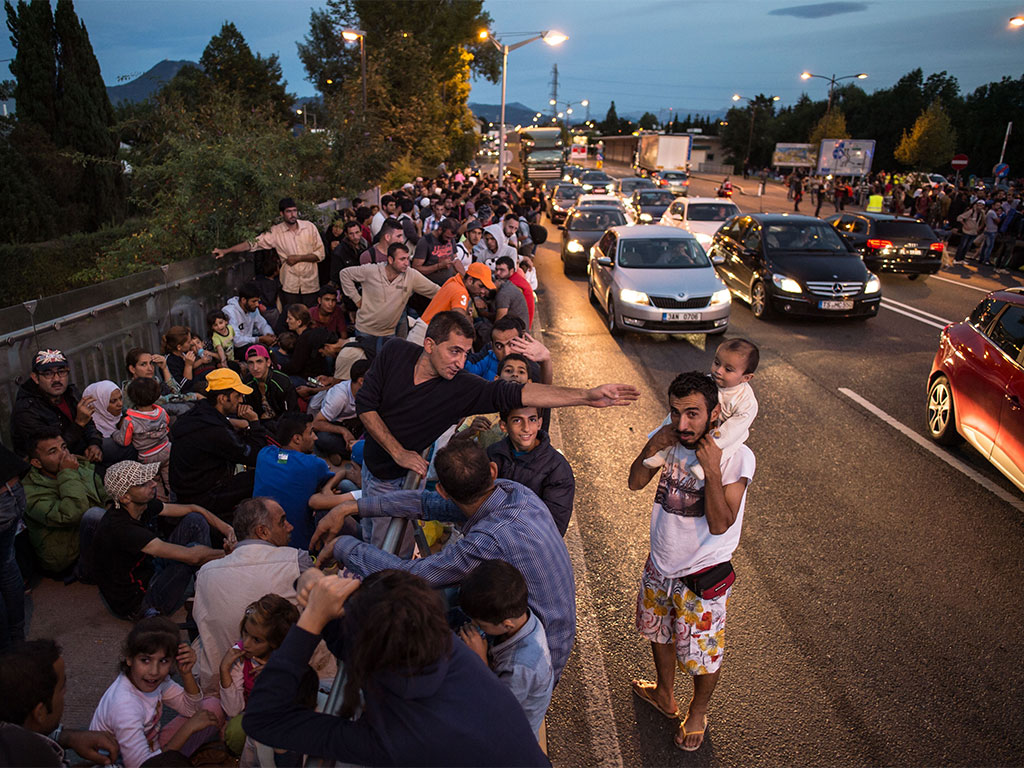Businesses help refugees to integrate across Europe
Companies are starting to take the initiative in welcoming refugees by launching internships, training courses and campaigns to heighten employment prospects

Refugees arrive in Germany
Arriving in a new country, unwillingly, with few belongings is scary enough – let alone with no money and having to provide for an entire family. Jobs are not always easy to find in a foreign country, especially with language barriers and a lack of connections.
However, businesses can help make the process easier and more comfortable for those arriving from conflict zones such as Syria, and many have already started the process. Refugees, who may be highly skilled and have the right to work, give businesses both an opportunity and a purpose – especially in markets struggling to find the appropriate skills and experience.
Some have started expanding their training programmes to include refugees; German companies Siemens and Deutsche Telekom have provided Syrian refugees with paid internships to gather the necessary skills to become full-time employees. International carrier Continental Airlines has also extended its training programme to refugees, while Daimler is providing refugees with training in machinery and tooling, even if they enter the training period with little experience in the sector. Paid internships provide income and should eventually land workers a contract with the company.
Uber’s campaign is an example of how one company can help alleviate the refugee crisis. If all companies launched a similar campaign, the effect would be colossal.
Another problem refugees have to overcome when gaining employment is language barriers– especially if the position requires customer communication. German tech company Trumpf is working with Ditzingen to create German language courses exclusively for refugees. Creating language courses, or funding external courses, could have a major impact on employment prospects.
Additionally, some companies are choosing to launch their own campaigns in order to raise awareness and encourage donations, especially in light of the refugee crisis. The most effective way to do so is to work cooperatively with charities and other organisations.
Giving it out
Last September, Uber ran a pan-European campaign called Uber Giving in response to the refugee crisis. The campaign ran in 20 European countries and more than 40 cities participated.
A spokeswoman for the company said: “The campaign varied per city as all of the charitable partners were selected at local level in order to be most effective and responsive to what the city organisations needed.”
The Uber Giving campaign meant pairing each country with its own partner charity. For example, the UK was partnered with Save the Children to collect donations of used clothing from high-street shops, profits from which funded their Child Refugee Crisis Appeal.
The spokeswoman added: “In Hungary and Prague, Uber collected goods on behalf of Caritas, which delivered to distribution centres for aid in refugee camps. In France, Uber collected donations to send to the French Red Cross. In the Netherlands, Uber collected sleeping bags with a local organisation that then delivered them to refugees on the Greek Isles. In Belgium, Uber worked with Doctors of the World to provide logistics support to medics who were attending to refugees currently housed in Brussels’ parks.”
Uber Giving was also announced in Germany, Italy, Portugal, Spain, Ireland, Poland, Romania, Slovakia, Finland, Sweden, Estonia, Denmark and Bulgaria, where cars collected material goods (warm clothing and camping equipment) and donated them to refugee centres.
Uber’s campaign is an example of how one company can help alleviate the refugee crisis. If all companies launched a similar campaign, the effect would be colossal.
Making a difference
Businesses have begun to mobilise as governments and local communities are helping to provide refugees with temporary accommodation. Hotel owners are providing free bedrooms to refugee families while they organise more permanent accommodation. Moreover, companies are holding cultural events to help refugees feel more settled in foreign countries. PwC has encouraged community integration through cultural events, sports programmes and language lessons. Others have provided information to refugees to help them find their way around new cities. One German newspaper has published Arabic language guides for refugees, and BVD, Berlin’s public transport network, has published Arabic language versions of its rail map, main underground stations and essential public transport information.
The crisis has affected countries on a global scale since the influx of Syrian refugees. There are camps in Germany, France, Greece, Turkey and many other European countries. All camps are in need of volunteers, though the non-profit organisations based at the camps often do not have the funds for their upkeep.
Therefore, an additional initiative for employers to alleviate the crisis is to encourage employees to volunteer in refugee camps, on the grounds that they will still be paid their salary. Even a day’s work volunteering at a refugee camp could make a difference – whether it means helping with distribution, cooking or organising donations. Not only does this heighten a company’s reputation, but it also meets the growing demands of consumers. It is evident that there is growing pressure from consumers for companies to be a part of the bigger picture – generating profit and providing customer service is no longer enough for a business to uphold a respected reputation.
Business and aid essentially go hand in hand; those in need are provided with the assistance they need, and employers gain skilled employees, help integrate refugees into communities, and maintain a good reputation.













